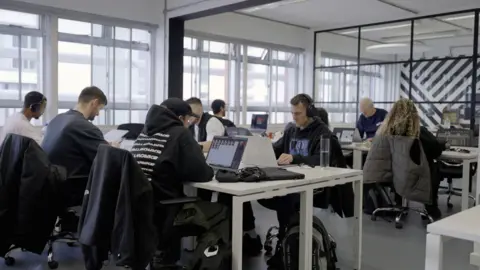Working from home 'not proper work' - ex-Asda boss
 BBC
BBCWorking from home is creating a generation who are "not doing proper work", the former boss of Marks and Spencer and Asda has warned.
Lord Rose told BBC Panorama that home working was part of the UK economy's "general decline" and employees' productivity was suffering.
His comments come as some companies are calling time on remote working. Amazon, Boots and JP Morgan are just some of the businesses who now require their head office staff to be in every day.
However, work-from-home expert Prof Nicholas Bloom said that while fully remote work can be "quite damaging" to some workers' productivity, spending three days out of five in the office was as productive as fully office-based work overall.
Lord Rose, who was chief executive of M&S and recently stepped down as the chairman of Asda, said: "We have regressed in this country in terms of working practices, productivity and in terms of the country's wellbeing, I think, by 20 years in the last four."
In a November 2024 GB snapshot survey by the Office for National Statistics, 26% of people said they had been hybrid-working in the prior seven days, with some days in the workplace and some days at home - while 14% had been fully remote and 41% had commuted to their workplace every day (the remainder were not working in the week surveyed).
The shift to working from home has transformed local economies. Industry estimates indicate that vacant office space has nearly doubled since the pandemic, a quarter of dry-cleaning businesses have shut down, and the number of golf games played during the working week has risen 350% - suggesting some people are mixing work and pleasure.

Working from home is rapidly becoming a major battleground in the culture wars. The government is currently legislating to strengthen the right of employees across the UK to request working from home and says that it intends to make it harder for employers to turn down requests.
But some employers - including government bodies - are battling with staff to get them back into the office, arguing that face-to-face interaction is essential to collaborative working.
In some cases, such as independent record label Hospital Records, this requires negotiation between a young workforce - some of whom may never have worked full-time in an office - and their older bosses.
Company founder Chris Goss, who introduced a new policy requiring staff work three days in the office rather than two, said he had "a nagging feeling" that remote working has affected the company's bottom line.
"I firmly believe that the music industry is all about relationships, and so the one single way for any of us to be able to build those kind of meaningful relationships is to do it in person."
Maya, a 25-year-old marketing manager at the company, said she likes being around her more experienced colleagues in the workplace. "There's a lot of people in my team that are a lot further along in their career, so if I need help with something, you know, I can just ask someone."

But she believes she would not be able to be in the office five days a week "because my social battery drains and I need sometimes to be just at home and just to smash out loads of admin".
Prof Bloom, a Stanford University economist, said his research into working from home suggests employees in their teens and early 20s should probably be in the office at least four days a week to maximise their opportunities for being mentored.
However, he said polls of tens of thousands of employees in the UK, US and Europe suggest workers valued the ability to work from home for two days a week about as much as an 8% pay rise.
Employment rights minister Justin Madders told Panorama there was a growing body of evidence that working from home was more productive. He also said it was good for growth because companies will have "a much more motivated workforce" and "if we're able to get more people into work because flexibility is available for them, that will help us reach our growth ambitions".

Prof Bloom may not be as optimistic about the effect hybrid working has on productivity, but he does agree that increasing the number of roles which can be done from home could help with economic growth if it encourages more people back into work, such as those with caring responsibilities.
"That is a huge boost" and "kind of a win, win, win", because people would be able to work in better conditions, contribute to tax revenue and "everyone gains".
One of the people who could benefit is Harleen, who was made redundant after she had her second child and has been unable to return to work because she cannot find a fully remote role that fits around her autistic son's routine.
"I am not seeing those jobs advertised. I'm not seeing anything that caters to that flexibility," she said.
"Every day I wake up and I'm thinking I'm living in Groundhog Day. All I'm doing is being a mother. I enjoy being a mum, but I want productivity. I start to feel like I'm just being brain dead."

In the public sector, productivity is the lowest it has been since 1997 - except for the pandemic lockdown years - and some blame working from home. Since November 2023, civil servants have been called back in for between two to three days a week.
But in several public bodies, including at the Office for National Statistics (ONS) in Newport, South Wales, some staff are refusing to return.
Ed, an IT delivery manager at the ONS and a rep for the PCS trade union, said he has worked almost entirely from home since the pandemic. He says it helps him to get his children to school and nursery and not waste time on commuting.
"We've never been told by senior leaders at the ONS that there is a problem with productivity, there's a problem with quality, there's a problem with meeting deadlines," he said.
"We will never see this opportunity again. We have to fight for workers' rights."
He and other union members are threatening to strike if they are forced to travel into the office 40% of the time. Civilian staff in the Metropolitan Police and union members at the Land Registry are also in dispute over policies on returning to the office.
The ONS, which is in talks with the union, says it believes "face-to-face interaction" helps to "build working relationships, supports collaboration, and innovation".
But whatever the outcome of disputes such as this, it is clear that all of us working full-time in the office is now a thing of the past.
